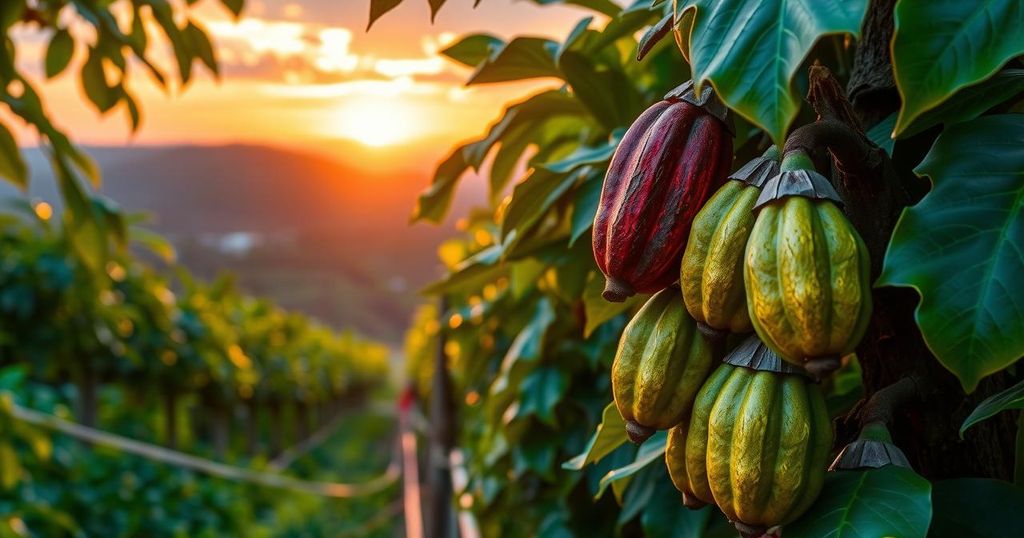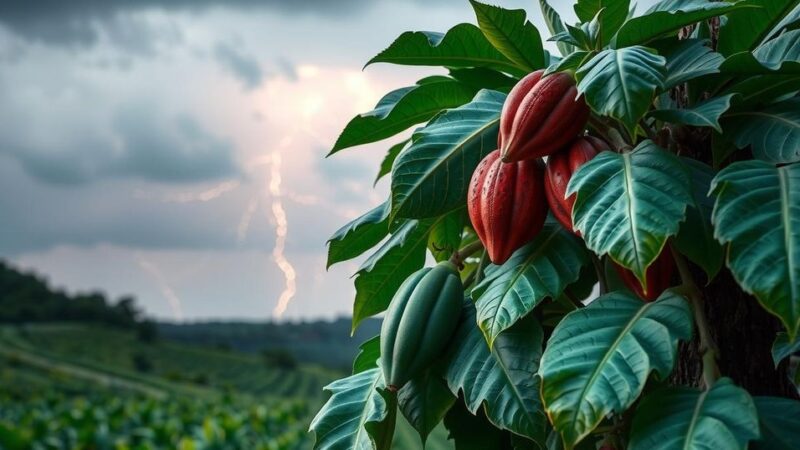The cocoa crisis driven by climate change is threatening the chocolate industry, with prices rising 400% due to extreme weather impacting yields in key regions like Côte d’Ivoire and Ghana. Chocolate manufacturers face increased costs and supply shortages while advocating for sustainability and fair trade practices. Immediate action is necessary to support cocoa farmers and secure the future of chocolate production.
The global cocoa crisis has intensified, presenting significant threats to the chocolate industry due to climate change, as detailed in a recent report by Christian Aid. Over the past few years, cocoa prices have surged by 400%, influenced by extreme weather events that have devastated cocoa harvests in key regions such as Côte d’Ivoire and Ghana. These areas produce over half of the world’s cocoa, making them pivotal to chocolate production.
A 2024 study revealed that climate change contributed to an alarming increase in days with temperatures above 32°C in 71% of cocoa-growing regions. This change not only disrupts optimal conditions for cacao trees but also adversely affects production. Consequently, chocolate brands, including major players like Nestle, are feeling these economic pressures, with cocoa availability dwindling significantly.
The 2023 shortage stemmed from an unusually heavy rainfall during Ghana’s dry season, leading to obesity problems in plants. Following the rainfall, severe drought conditions ensued in 2024, impacting over a million people and compounding food insecurity. Despite the dire situation, responses from chocolate manufacturers emphasize the need for sustainable practices and adaptation strategies.
Christian Aid emphasizes that effective climate finance and emission reduction efforts are essential to mitigate the crisis. Osai Ojigho, their Director of Policy and Public Campaigns, stated that cocoa production sustains many impoverished communities and is jeopardized by global warming. She urged for better support and targeted financial assistance for cocoa farmers to adapt to these changes.
Cocoa growers like Amelia from Guatemala have expressed dire consequences of climate impacts, sharing stories about their dying plantations and diminished harvests. Andy Soden of Kernow Chocolate further illustrated the precarious situation for small manufacturers amidst spiraling prices and supply shortages, highlighting a risk of long-term business viability.
Industry insights reflect that environmental sustainability and fair compensation are interlinked. Alexander Carnwath of the Fairtrade Foundation reinforced that sustainable trade practices are crucial for farming communities. By ensuring fair prices, both the economic health of cocoa producers and effective climate action can be achieved simultaneously.
As the cocoa industry grapples with these climate-driven challenges, the overarching need for collective action is clearer than ever. Chocolate producers must adopt sustainable practices alongside governments to safeguard the future of this vital agricultural sector, ensuring that both farmers and consumers can enjoy chocolate for generations to come.
In conclusion, climate change poses a severe threat to cocoa cultivation, leading to a significant rise in prices and jeopardizing the livelihoods of farmers across major producing regions. Concerted efforts focusing on emission reductions, climate finance, and sustainable practices are crucial not only to protect cocoa production but also to ensure the future of the chocolate industry and the communities that depend on it. The urgent call for a coherent approach across trade, development, and climate policies remains a priority to avert further crises.
Original Source: reliefweb.int






